J2807 is the benchpress of the truck world and Dodge Ram just called out the other truck gym rats to throw down and beat their bench press max.
The torque wars are alive and well in Detroit as Dodge just announced earlier today (June. 22,2015) that their 6.7 liter Cummins turbo diesel engine makes 900 lb.-ft of torque. That makes their Ram 2500 and 3500 HD trucks the most powerful mass produced vehicles when it comes to torque ratings. The next most powerful engine is Ford’s Powerstroke with 860 lbs-ft of torque. If there was a bench press in the truck world, it would be SAE’s J2807 spec towing capacity test as the 2016 Ram 3500 laid down some pretty impressive numbers.
Here’s the tail of the tape according to Dodge,
- 2016 Ram 3500 has up to 31,210 pounds of SAE J2807-spec. towing capacity.
- 2016 Ram 2500 holds best-in-class ¾-ton towing with 17,980 pounds of capacity
- Ram 3500 maintains best-in-class payload of 7,390 pounds with 6.4-liter HEMI® V-8
- Ram 3500 raises its best-in-class Gross Combined Weight Rating (GCWR) to 39,100 pounds

In addition, Ram was pretty adamant that they are the only truck manufacturer to use SAE J2807’s testing method on their whole lineup of trucks. Just like the bench press analogy, Ram is pretty much calling out Ford, Chevrolet and maybe Toyota and Nissan to step up to the bench press and throw down.

So what exactly is J2807? It’s a measurable set of test protocols that are standardized to fairly measure maximum tow ratings for pickup trucks. Test methods include,
- Cooling capacity on a long highway upgrade (they actually use Davis Dam grade on Arizona SR 68.)
- Launch and acceleration on a level road and a up a 12-percent grade
- Specific tests for understeer and trailer sway
- Brake performance on sloping grades and how well the parking brake holds a load on a slope
- Structural performance for the vehicle, the hitch, and hitch receiver
So why do most truck manufacturers sway away (pun intended) from this test? Because the numbers that come from this test would most likely conflict with what they claim based on their own tests. It can either confirm their numbers, humiliate their previous numbers or surprise them with better numbers (but most likely the last two options.)
